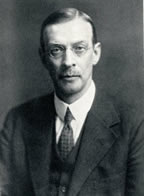Archibald Allan Bowman (1883-1936)

A A Bowman (Archibald Allan), the son of a Congregational minister, was born in Beith, Ayrshire, and educated at Beith Academy and the Spiers School. A A Bowman’s family lived in very straitened financial circumstances, greatly exacerbated by the death of his father as Bowman was concluding his schooling. At this early age he had to share responsibility with his mother for the maintenance and upbringing of the rest fo the family, but a series of awards and scholarships enabled him to attend the University of Glasgow. A student of Sir Henry Jones and Robert Latta, he graduated with first class honours in Philosophy in 1905. In 1906 he was appointed Assistant Lecturer in Philosophy at Glasgow, and subsequently studied during the summer vacations at the Universities of Heidelberg, Leipzig and Berlin, becoming a fluent German speaker.
In 1912, A A Bowman followed a familiar path for Scottish educated philosophers and moved to Princeton University where he had been appointed Stuart Professor of Logic in the same Department as his compatriot Norman Kemp Smith who had held the Chair of Psychology there since 1906. When World War I broke out, the President of Princeton, knowing his loyalties, offered to release him from his position until such time as the war had ended. A A Bowman was commissioned in the Highland Light Infantry. His war service, and the fact that he was taken prisoner by the Germans, adversely and permanently affected his health.
In 1919 he was released from the army, returned to the Stuart Chair in Princeton and in 1921 became Chair of the Dept of Philosophical Studies there. In 1925 Glasgow offered him the Chair of Logic. Bowman accepted with deep reluctance, and despite an attractive counter-offer from Princeton, because of a deep sense of obligation to assist in the restoration of the University and City of Glasgow, both of which had suffered badly from the war. Princeton honored him with a D Litt degree before he returned to his alma mater in 1926. Just one year later, he was translated from the Chair of Logic to the Chair of Moral Philosophy, exactly 200 years after Francis Hutcheson’s appointment to the same Chair. He returned to the United States in 1929 to serve as Mills Lecturer at the University of California and to Princeton in 1934 to give the Vanuxem Lectures. Though his health was poor, his death in 1936 at the age of 53 was sudden and unexpected.
A A Bowman was a very fine teacher who shared, and continued, the traditional Scottish conception of the role of the professor of philosopher and the place of moral philosophy in the arts degree. He was greatly admired and respected by his students, but more striking was the very high regard in which he was held by the philosophical profession, despite a relatively small number of essays published in his life-time. After his death, Kemp Smith saw to publication his two volume Studies in the Philosophy of Religion. The work was one on which he had labored for many years, and though never completed in its final form, revealed a remarkable familiarity with the anthropology of religion (to which the first volume was devoted) and an independently minded and constructively imaginative approach to traditional questions in the philosophy of religion (to which the second volume was devoted). The Sacramental Universe, based on the first four Vanuxem Lectures was also published postumously was described in 1953 by his successor in the Chair of Logic (C A Campbell) as containing ‘some of the finest philosophical writing of recent times’.
Post-Enlightenment Philosophers
- Lady Mary Shepherd (1777-1847)
- Thomas Brown (1778-1820)
- Sir William Hamilton (1788-1856)
- Thomas Carlyle (1795-1881)
- James Frederick Ferrier (1808-1884)
- Alexander Bain (1818-1903)
- Alexander Campbell Fraser (1819-1914)
- James Hutcheson Stirling (1820-1909)
- John Veitch (1829-1894)
- Henry Calderwood (1830-1897)
- Edward Caird (1835-1908)
- Robert Flint (1838-1910)
- William Minto (1845-1893)
- Sir Henry Jones (1852-1922)
- David George Ritchie (1853-1903)
- Andrew Seth Pringle Pattison (1856-1931)
- James Seth (1860-1925)
- Robert Latta (1865-1932)
- Norman Kemp Smith (1872-1958)
- Archibald Allan Bowman (1883-1936)
- John Macmurray (1891-1976)
- C A Campbell (1897-1974)
- David Daiches Raphael (1916-2015)
- George Elder Davie (?)